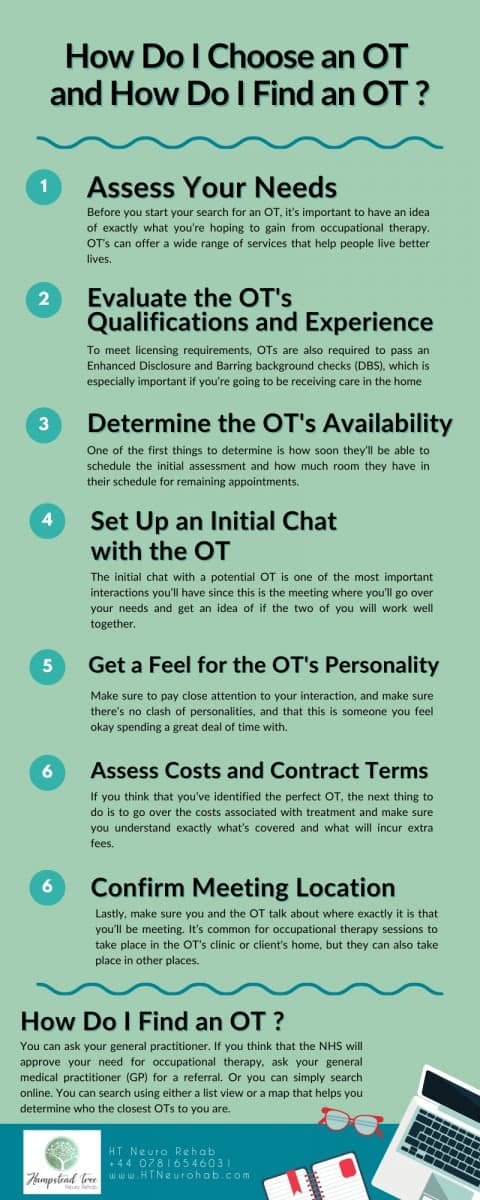
It can be challenging if you or a loved one have difficulty completing basic tasks related to work or independent living. The first step on the road to recovery is finding the right occupational therapist (OT) to support both the client and their caregivers.
Before choosing an occupational therapist (OT), discuss your needs with your general medical practitioner. From there, start your search for an OT based on their recommendations and evaluate candidates’ qualifications, experience, availability, and cost.
Finding an OT can be overwhelming if you’ve never had to do it before, and choosing the right one for your needs is crucial. Fortunately, the process can be broken down into a few simple steps.
How Do I Choose an OT?
To be effective, an OT needs to be qualified, but they also need to be the right fit for the client. It’s advisable to evaluate a few OTs before settling on one, so you can be sure to find someone who will meet your needs.
The huge number of occupational therapists there are to choose from can be overwhelming, but you can do a few things to narrow down the list.
Assess Your Needs
Before you start your search for an OT, it’s important to have an idea of exactly what you’re hoping to gain from occupational therapy. OT’s can offer a wide range of services that help people live better lives, including:
- Provide recommendations for housing adaptations and necessary equipment
- Rehabilitation therapy
- Mental health support
- Vocational/workplace support
- Training and support for prolonged disorders of consciousness
The clearer you are about exactly what help you need, the better able you’ll be to communicate this to the OT, so you can both determine if the OT can meet your particular needs.
Evaluate the OT’s Qualifications and Experience
It’s important to make sure that any OT you’re considering has proper qualifications and training. An OT needs to have a working knowledge of many different aspects of client care, such as:
- Biology, health science, or psychology
- Strong, clear communication skills
- Patient and caregiver counseling
- Teaching/instructing and course planning
To meet professional and licensing requirements, OTs are also required to pass enhanced background checks, which is especially important if you’re going to be receiving care in the home.
The HCPC keeps a record of all registered OTs in the UK, so their site is a good first place to check when verifying an OT’s credentials. You can learn more here.
Determine the OT’s Availability
Depending on how urgently you’re looking to start occupational therapy, the OT’s availability can be quite an important thing to consider.
One of the first things to determine is how soon they’ll be able to schedule the initial assessment and how much room they have in their schedule for remaining appointments.
Next to location, appointment times are one of the main tactical considerations people have to think about; this is especially true if the client’s caregivers must take off work for the appointments or if they’re being squeezed in between other ongoing medical appointments.

Set Up an Initial Chat with the OT
The initial chat with a potential OT is one of the most important interactions you’ll have since this is the meeting where you’ll go over your needs and get an idea of if the two of you will work well together.
The RCOT has an excellent list of suggested questions to ask during your initial conversation, some of which are:
- What is your experience in this area of work?
- What services will I receive?
- Will I get a report?
- Can you provide advice on any equipment I might need?
- Will you work with other occupational therapists if they are involved?
Once basic needs are established and expectations are set, most OTs will set up an initial assessment to further understand your needs and set up a suggested course of action.
Get a Feel for the OT’s Personality
Because OTs work so closely with clients and their caretakers, usually for prolonged periods, the OT you select must have a personality that will add to your recovery process rather than hinder it.
Make sure to pay close attention to your interaction, and make sure there’s no clash of personalities, and that this is someone you feel okay spending a great deal of time with. Ideal personality traits for OTs are:
- Patience
- Communication
- Sensitivity
- Flexibility
- Non-judgmental
You’ll be able to get a feel for the OT’s personality by observing how they listen and react to your explanation of your situation and whether they make a point of determining exactly what your goals in therapy are.
Trust your intuition, and if your gut is telling you to pass on a potential OT, keep looking until you find the perfect match. OTs are professionals, and they understand the need to find the right fit, so you’re not going to offend anyone if you keep looking.

Assess Costs and Contract Terms
If you think that you’ve settled down on the perfect OT, the next thing to do is to go over the costs associated with treatment and make sure you understand exactly what’s covered and what will incur extra fees. If possible, be sure to get all this in writing, so you have it on hand later, should any questions about your bill pop up.
Additionally, be sure that you understand any paperwork you’re signing and exactly what the contract terms are. It’s best to make sure you’re clear on what to expect from your OT before signing anything, rather than being surprised after the fact.
Confirm Meeting Location
Lastly, make sure you and the OT talk about where exactly it is that you’ll be meeting. It’s common for occupational therapy sessions to take place in the OT’s clinic, but they can also take place:
- In the client’s home
- At the client’s workplace
- In a community setting
Sometimes, the OT will charge extra if they have to travel to the sessions, so be sure to factor this in when discussing costs.
How Do I Find an OT?
Now that you have a plan ready for assessing potential OTs, let’s look at how to go about finding one.
Ask Your General Practitioner
If you think that the NHS will approve your need for occupational therapy, ask your general medical practitioner (GP) for a referral. Your GP, or other regular healthcare professional or social worker, is a great starting place regardless, as he or she will be familiar with your situation and have an idea of what OT might be the best fit for your particular needs.
Alternatively, the NHS recommends contacting your local council to see if they’ll approve getting an OT.
Search Online
You might be looking for an independent OT instead of, or in addition to, working with an OT through the NHS.
The Royal College of Occupational Therapists offers a robust search tool that lets you search for OTs by:
- Location
- Age group treated (children, adolescents, young or older adults)
- Skills and Specialisation
You can search using either a list view or a map that helps you determine who the closest OTs to you are. You can also use the Health and Care Professionals site to verify that any OT you’re considering is qualified and registered.
Final Thoughts
An OT can help make a difficult time a bit less challenging, providing physical and mental support to clients and their families. But it’s important to find the right OT for you, so be sure to do your research ahead of time and get to know the person before committing.
Content Disclaimer
The information contained above is provided for information purposes only. The contents of this Blog article are not intended to amount to advice, and you should not rely on any of the contents of this Blog article. Professional advice should be obtained before taking or refraining from taking any action as a result of the contents of this Blog article. OccupationaltherapyBlog disclaims all liability and responsibility arising from any reliance placed on any of the contents of this Blog article.

